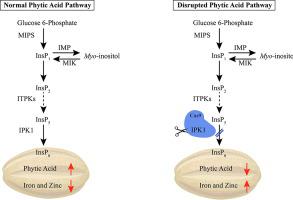Journal of Advanced Research ( IF 10.7 ) Pub Date : 2021-07-14 , DOI: 10.1016/j.jare.2021.07.006 Saira Ibrahim 1 , Bilal Saleem 1, 2 , Nazia Rehman 2 , Syed Adeel Zafar 2 , Muhammad Kashif Naeem 2 , Muhammad Ramzan Khan 1, 2

|
Introduction
Phytic acid (PA) is an important antinutrient agent present in cereal grains which reduces the bioavailability of iron and zinc in human body, causing malnutrition. Inositol pentakisphosphate 2- kinase 1 (IPK1) gene has been reported to be an important gene for PA biosynthesis.
Objective
A recent genome editing tool CRISPR/Cas9 has been successfully applied to develop biofortified rice by disrupting IPK1 gene, however, it remained a challenge in wheat. The aim of this study was to biofortify wheat using CRISPR/Cas9.
Methods
In this study, we isolated 3 TaIPK1 homeologs in wheat designated as TaIPK1.A, TaIPK1.B and TaIPK1.D and found that the expression abundance of TaIPK1.A was stronger in early stages of grain filling. Using CRISPR/Cas9, we have disrupted TaIPK1.A gene in cv. Borlaug-2016 with two guide RNAs targeting the 1st and 2nd exons.
Results
We got several genome-edited lines in the T0 generation at frequencies of 12.7% and 10.8%. Sequencing analysis revealed deletion of 1–23 nucleotides and even an addition of 1 nucleotide in various lines. Analysis of the genome-edited lines revealed a significant decrease in the PA content and an increase in iron and zinc accumulation in grains compared with control plants.
Conclusion
Our study demonstrates the potential application of CRISPR/Cas9 technique for the rapid generation of biofortified wheat cultivars.
中文翻译:

CRISPR/Cas9 介导的五磷酸肌醇 2-激酶 1 (TaIPK1) 破坏可减少植酸并改善小麦籽粒中铁和锌的积累
介绍
植酸(PA)是一种重要的抗营养剂,存在于谷物中,会降低人体内铁和锌的生物利用度,导致营养不良。肌醇五磷酸2-激酶1 ( IPK1 )基因已被报道为PA生物合成的重要基因。
客观的
最近的基因组编辑工具 CRISPR/Cas9 已成功应用于通过破坏IPK1基因来开发生物强化水稻,然而,它在小麦中仍然是一个挑战。本研究的目的是使用 CRISPR/Cas9 对小麦进行生物强化。
方法
在本研究中,我们在小麦中分离了3个TaIPK1同源物,分别命名为TaIPK1.A、TaIPK1.B和TaIPK1.D,发现TaIPK1.A的表达丰度在灌浆早期更强。使用 CRISPR/Cas9,我们破坏了 cv 中的TaIPK1.A基因。Borlaug-2016 有两个针对第一个和第二个外显子的引导 RNA。
结果
我们在 T 0代中以 12.7% 和 10.8% 的频率获得了几个基因组编辑品系。测序分析揭示了 1-23 个核苷酸的缺失,甚至在不同的品系中增加了 1 个核苷酸。对基因组编辑品系的分析显示,与对照植物相比,谷粒中 PA 含量显着降低,铁和锌积累增加。
结论
我们的研究证明了 CRISPR/Cas9 技术在快速生成生物强化小麦品种方面的潜在应用。


























 京公网安备 11010802027423号
京公网安备 11010802027423号